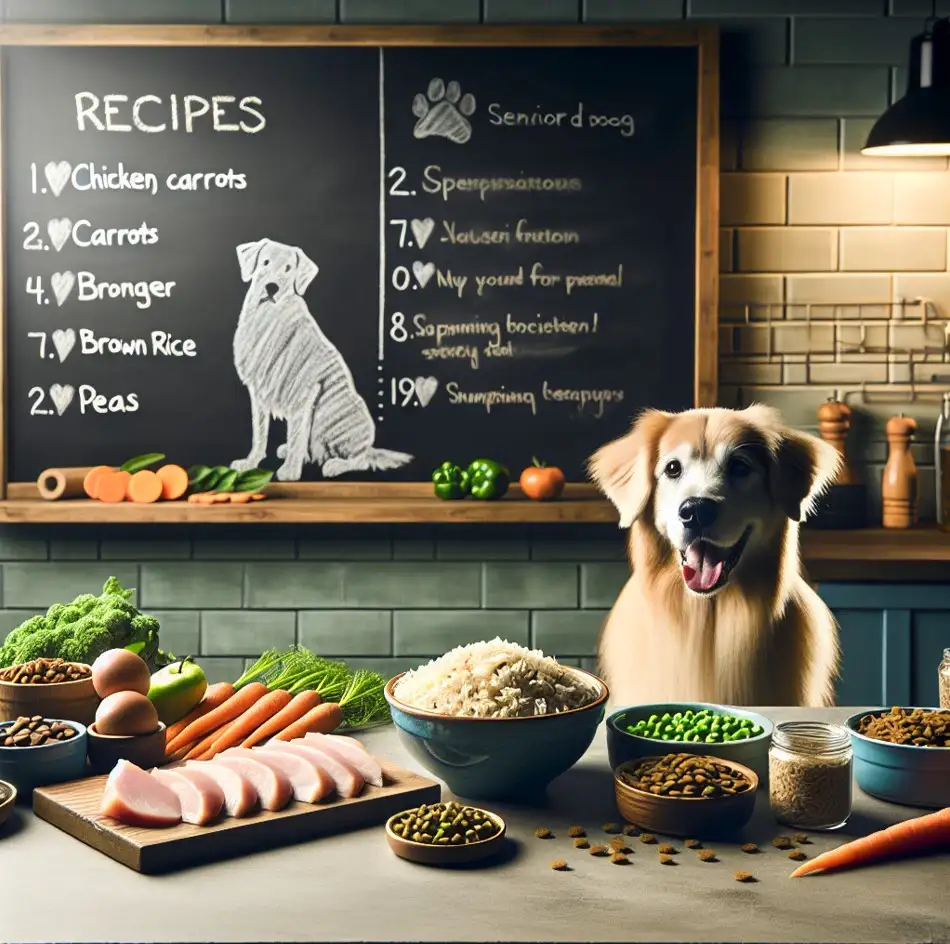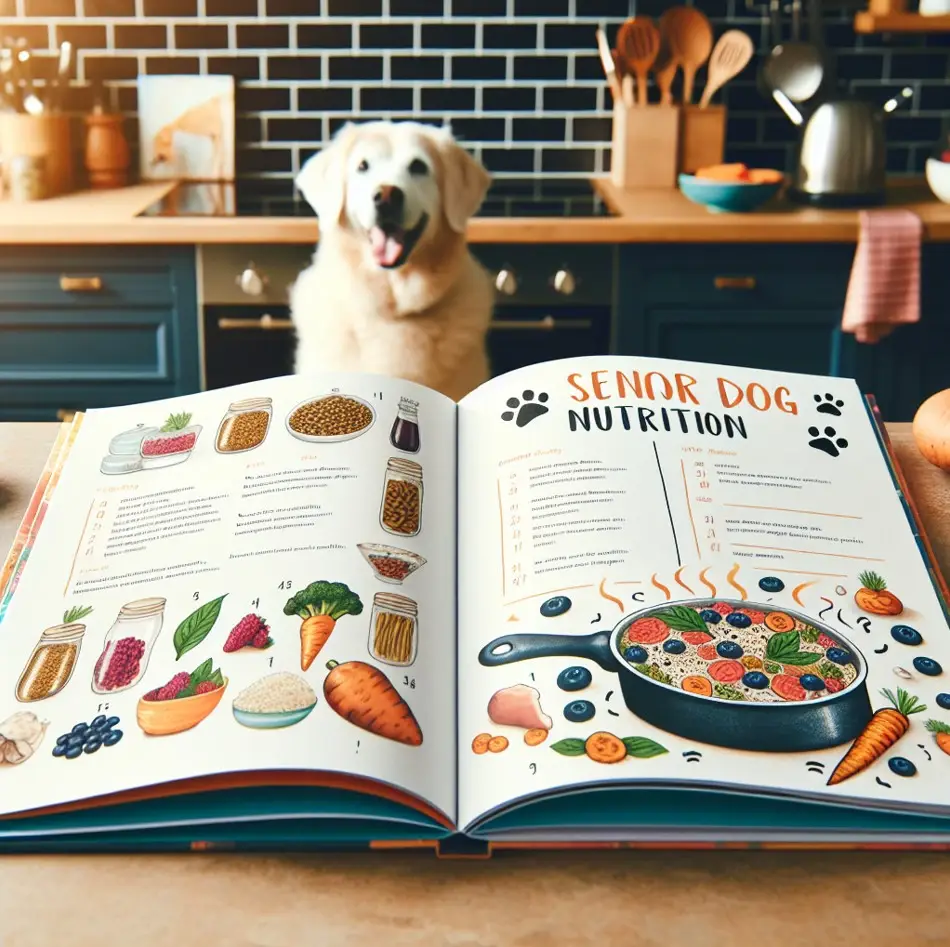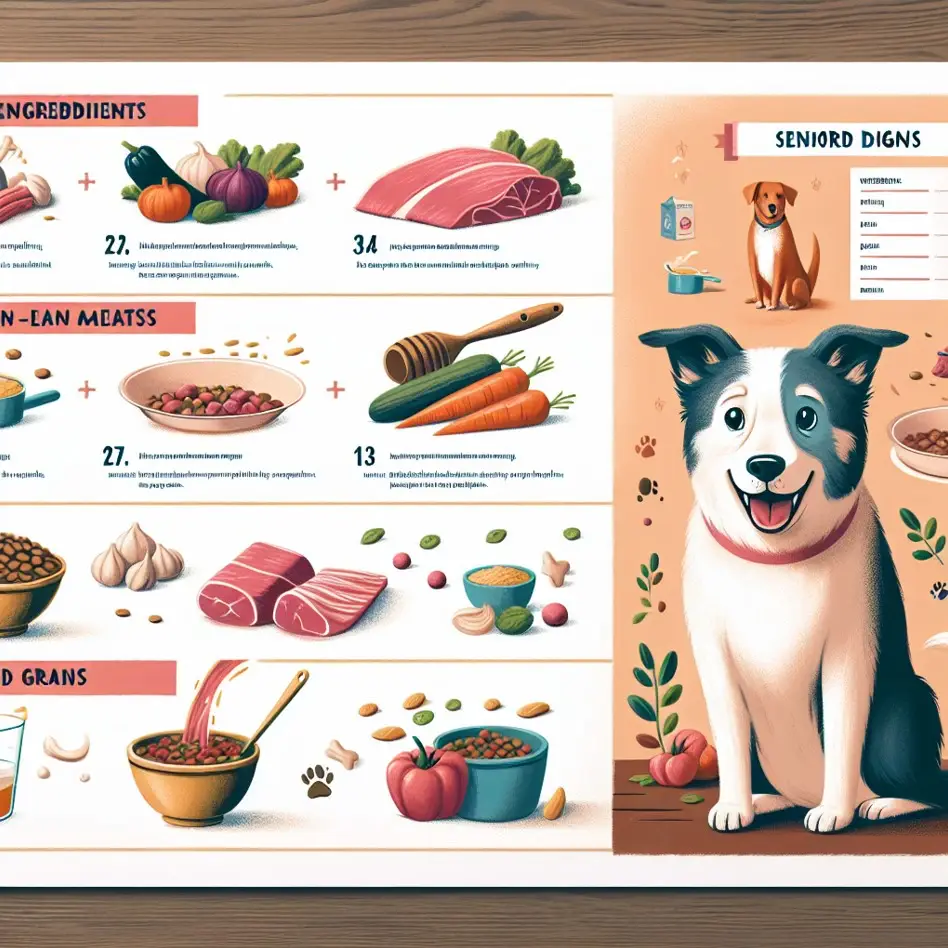Hello fellow dog lovers! If you’ve come across my blog, you’re likely searching for the best homemade recipes to keep your senior dog healthy, happy, and thriving. Just like humans, our furry friends’ nutritional needs evolve as they age. Providing them with the right balance of nutrients can make a world of difference in their overall well-being.
In this post, I’ll share eight carefully crafted recipes that cater specifically to senior dogs. These recipes focus on essential nutrients, easy digestion, and flavors your dog will love—all made from wholesome, everyday ingredients. Let’s get started!
Why Choose Homemade Dog Food for Senior Dogs?
Before we jump into the recipes, I want to highlight why homemade meals can be a wonderful option for senior dogs:
- Control Over Ingredients: By preparing meals at home, you know exactly what goes into your dog’s food, allowing you to avoid harmful additives and fillers.
- Customization: You can tailor recipes to address specific health conditions your senior dog may have, such as joint issues or digestive problems.
- Freshness and Quality: Homemade meals use fresh, high-quality ingredients that provide optimal nutrition.
- Improved Digestion: Many dogs find it easier to digest fresh food compared to commercial kibble.
Now that we know the benefits, let’s explore some delicious recipes!
Recipe 1: Chicken and Rice Delight
Ingredients:
- 2 cups cooked chicken breast, shredded
- 1 cup brown rice, cooked
- 1/2 cup carrots, finely chopped
- 1/2 cup peas
- 1 tablespoon olive oil
Instructions:
- In a large bowl, combine the cooked chicken, rice, carrots, and peas.
- Drizzle with olive oil and mix well.
- Serve the meal in portions appropriate for your dog’s size. This recipe is rich in protein and easy to digest, making it perfect for seniors.
Recipe 2: Beef and Sweet Potato Mash
Ingredients:
- 1 pound lean ground beef
- 2 cups sweet potatoes, mashed
- 1/2 cup green beans, chopped
- 1 teaspoon turmeric
Instructions:
- Cook the ground beef in a skillet over medium heat until it’s thoroughly browned. Drain any excess fat.
- In a mixing bowl, combine the beef, mashed sweet potatoes, green beans, and turmeric.
- Mix thoroughly and serve warm. This hearty dish offers anti-inflammatory benefits from turmeric.
Recipe 3: Fish and Quinoa Feast
Ingredients:
- 2 cups cooked white fish (like cod or tilapia)
- 1 cup quinoa, cooked
- 1/2 cup spinach, chopped
- 1 tablespoon coconut oil
Instructions:
- Flake the cooked fish and mix it with quinoa, spinach, and coconut oil.
- Blend well and serve warm. The fish provides omega-3 fatty acids, supporting joint health and a shiny coat.
Recipe 4: Turkey and Pumpkin Stew
Ingredients:
- 1 pound ground turkey
- 1 cup pumpkin puree
- 1/2 cup oats
- 1/4 cup cranberries, unsweetened
Instructions:
- Cook the ground turkey in a pot over medium heat until browned, then add the pumpkin puree and oats.
- Stir in the cranberries and simmer for 10 minutes.
- Serve the stew warm. Pumpkin is fantastic for digestive health, making this stew senior-friendly.

Recipe 5: Lamb and Vegetable Medley
Ingredients:
- 1 cup lamb, diced and cooked
- 1 cup brown rice, cooked
- 1/2 cup zucchini, sliced
- 1/4 cup parsley, chopped
Instructions:
- Combine the lamb, rice, zucchini, and parsley in a large bowl.
- Stir until ingredients are evenly distributed.
- Serve warm. Lamb is gentle on digestion and packed with essential amino acids.
Recipe 6: Egg and Cheese Breakfast
Ingredients:
- 3 eggs
- 1/4 cup low-fat cottage cheese
- 1/2 cup spinach, chopped
Instructions:
- Scramble the eggs in a skillet over medium heat until cooked through.
- Mix in cottage cheese and spinach, cooking until the spinach wilts slightly.
- Cool and serve. Eggs offer protein and essential fats, making this a nutritious breakfast option.
Recipe 7: Pork and Apple Dinner
Ingredients:
- 1 cup pork loin, cooked and diced
- 1/2 cup apples, diced
- 1/2 cup carrots, chopped
- 1 teaspoon rosemary
Instructions:
- Mix the pork, apples, carrots, and rosemary in a bowl.
- Serve warm. Apples add natural sweetness and fiber, while rosemary provides antioxidants.
Recipe 8: Chicken Liver and Brown Rice
Ingredients:
- 1 cup chicken liver, cooked and chopped
- 1 cup brown rice, cooked
- 1/4 cup peas
- 1/4 cup pumpkin puree
Instructions:
- Combine chicken liver, rice, peas, and pumpkin puree in a bowl.
- Mix well and serve. Chicken liver is packed with vitamins and minerals that support senior health.

Tips for Feeding Senior Dogs
Here are some additional tips to enhance your senior dog’s diet:
- Consult Your Vet: Before making dietary changes, it’s always wise to consult your veterinarian, especially if your dog has specific health concerns.
- Monitor Portions: Adjust portion sizes according to your dog’s weight, age, and activity level to maintain a healthy body weight.
- Introduce Gradually: When introducing new foods, do so gradually to avoid digestive upset.
- Stay Hydrated: Ensure your dog always has access to fresh water, as hydration is crucial for overall health.
Frequently Asked Questions
1. How often should I feed my senior dog homemade meals?
Homemade meals can be given once or twice a day, depending on your dog’s nutritional needs and dietary preferences. It’s important to maintain a consistent feeding schedule and adjust portion sizes to match your dog’s energy level and weight management requirements.
2. Can I replace commercial dog food entirely with homemade meals?
Yes, you can replace commercial dog food with homemade meals, but ensure the meals are nutritionally balanced and meet your dog’s dietary needs. Consulting with a veterinarian or a canine nutritionist can help you create a complete feeding plan.
3. Are these recipes suitable for dogs with allergies?
Many of these recipes are made with simple ingredients, making it easier to exclude allergens. However, if your dog has specific allergies, it’s crucial to tailor the recipes accordingly and consult with your vet to avoid any adverse reactions.
4. Can I freeze these homemade meals?
Yes, you can prepare meals in bulk and freeze portions for later use. This is a convenient way to ensure you always have a healthy meal ready for your senior dog. Just make sure to thaw and warm them appropriately before serving.
5. Why is it important to include turmeric in some recipes?
Turmeric has anti-inflammatory properties that can benefit senior dogs, especially those suffering from joint pain or arthritis. Including a small amount of turmeric can promote joint health and alleviate discomfort.
6. How do I know if my dog is getting the right nutrients from these meals?
Balanced homemade diets should include a mix of proteins, carbohydrates, fats, vitamins, and minerals. Regular veterinary checkups and sometimes blood tests can help ensure that your dog is receiving all essential nutrients.
7. Should I add supplements to these meals?
Depending on your dog’s health status and dietary needs, supplements such as omega-3 fatty acids, glucosamine, or multivitamins might be beneficial. However, it’s best to seek advice from your vet before adding any supplements to your dog’s diet.
8. How can I incorporate more variety into my dog’s meals?
Rotate different proteins and vegetables within your homemade recipes to provide a varied diet. This not only keeps meals interesting for your dog but also helps in offering a broader range of nutrients.
9. Are grains like brown rice and oats important in a senior dog’s diet?
Grains like brown rice and oats are excellent sources of carbohydrates, providing energy and fiber that can aid digestion. Unless your dog has a grain allergy, including them can complement a balanced diet.
10. How should I introduce homemade meals to my dog’s diet?
Gradually introduce homemade meals by mixing a small amount with their regular food, slowly increasing the proportion of homemade to commercial food over a week. This gradual transition helps avoid digestive issues.
11. What if my senior dog has a sensitive stomach?
If your dog has a sensitive stomach, stick to simple, easily digestible recipes. Monitoring your dog’s reaction and consulting with your vet will help in adjusting the diet to better suit your dog’s needs.
12. Can I include fruits and vegetables in homemade meals daily?
Yes, incorporating suitable fruits and vegetables provides essential nutrients and can enhance meal variety. However, ensure they are safe for canine consumption and avoid toxic items like grapes, onions, or garlic.

